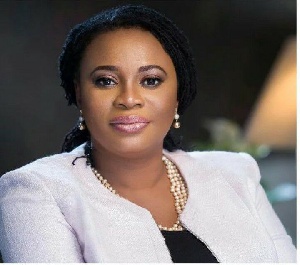The Supreme Court has dismissed an application for interlocutory injunction to restrain President Akufo-Addo from appointing a new chairperson for the Electoral Commission (EC) pending the determination of a suit against the removal of Charlotte Osei from office.
A private citizen, Fafali Nyonator, filed a suit at the apex court to challenge the dismissal of Charlotte Osei and her two deputies, Amadu Sulley and Georgina Opoku-Amankwa, who were found guilty of charges levelled against them by some petitioners.
In the suit, she claims that the committee set up by the Chief Justice to investigate the allegations levelled against the EC officers acted in excess of its powers when it recommended the removal of the former EC bosses from office.
Ms Nyonator later prayed the court for an injunction to stop the President from permitting any person to serve as the substantive chairperson of the EC pending the determination of her suit which seeks to quash the recommendations of the Chief Justice Committee.
Appearing before the Supreme Court yesterday, her lawyer, Chris Ackumey, a member of the National Democratic Congress (NDC), prayed the court to grant the interlocutory injunction application because in the likely event that his client’s claims in the substantive suit are upheld, the position of chairperson of EC cannot be said to be vacant to require the appointment of another person.
He told the court that the overriding purpose of the action is to assist to entrench the rule of law and seek legal remedies for “patent violations of the Constitution.”
He challenged the prima facie case established by the Chief Justice based on which the committee was set up to look into the allegations against the EC boss and her two deputies.
“We are of the view that the application for interlocutory injunction is appropriate to prevent further infringement of the 1992 Constitution,” Mr. Ackumey averred.
He told the court that it is a known fact that the president has nominated Jean Adukwei Mensah as the potential chairperson of the EC and that she had received the approval of the Council of State.
“In the likely event that she is appointed and this suit succeeds, there will be two EC chairpersons,” he averred.
Mr. Ackumey also added that the issue of damages does not arise if the application is granted.
He said the applicant has no stake in the EC and that the people of Ghana stand to gain if the application is granted.
Opposition
Deputy Attorney-General, Godfred Yeboah Dame vehemently opposed the application, describing it as frivolous and without merit.
However, he said Article 2 Clause 2 of the 1992 Constitution makes express provisions for remedies regarding orders if the substantive writ succeeds.
“It cannot be contended that the current action (writ) will be rendered nugatory in the absence of an interlocutory injunction,” Mr Dame averred.
He told the court that the EC has very important roles to play for the nation, stating that the current action is only fighting for the interest of Charlotte Osei.
He averred that the functions of the EC cannot be carried out without a chairman and deputies as the EC has various elections as well as referendum to conduct.
He, therefore, prayed the court to dismiss the application which does not raise any constitutional issues as claimed by the applicant.
Ruling
A panel of five justices presided over by Justice Julius Ansah, with Justices Jones Dotse, Anin Yeboah, Paul Bamfoe Bonnie, Sule Gbadegbe, Vida Akoto Bamfo and Yaw Apau assisting, refused to grant the application.
Justice Ansah held that Article 2 Clause 2 of the 1992 Constitution adequately makes provisions for remedies in the likely event that a writ succeeds.
The court held that it would refrain from making further comments in order not to prejudice the outcome of the substantive matter.
Appointment
Meanwhile, the Deputy AG has indicated that the president would in the next 24 hours or so appoint a new chairperson of the Electoral Commission.
According to him, given the decision of the apex court to dismiss the application for interlocutory injunction, there is no impediment on the President to go ahead and appoint a new chairperson of the EC.
He added that the president would act in accordance with the law and ensure that a new chairperson is appointed to handle the affairs of the EC.
General News of Wednesday, 1 August 2018
Source: dailyguideafrica.com













